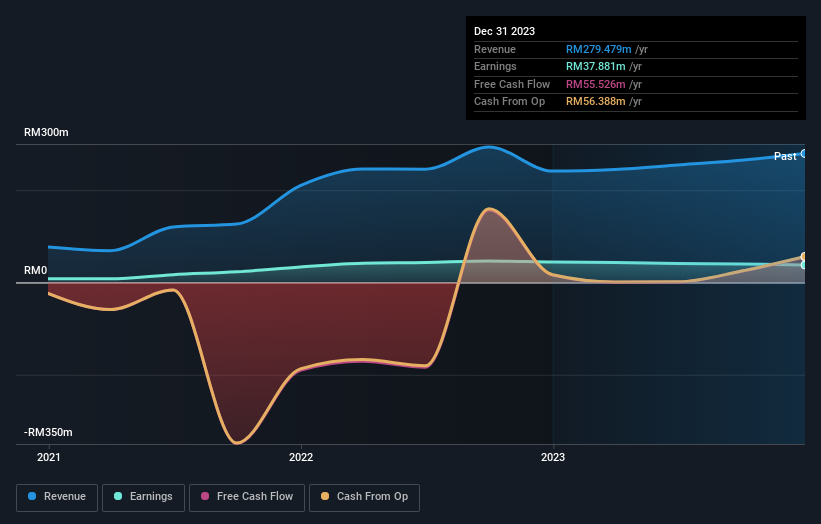NCT Alliance Berhad's (KLSE:NCT) largest shareholders are private companies with 55% ownership, individual investors own 17%
Key Insights
Significant control over NCT Alliance Berhad by private companies implies that the general public has more power to influence management and governance-related decisions
The largest shareholder of the company is YBG Yap Consolidated Sdn. Bhd. with a 52% stake
If you want to know who really controls NCT Alliance Berhad (KLSE:NCT), then you'll have to look at the makeup of its share registry. The group holding the most number of shares in the company, around 55% to be precise, is private companies. Put another way, the group faces the maximum upside potential (or downside risk).
Meanwhile, individual investors make up 17% of the company’s shareholders.
Let's delve deeper into each type of owner of NCT Alliance Berhad, beginning with the chart below.
Check out our latest analysis for NCT Alliance Berhad
What Does The Institutional Ownership Tell Us About NCT Alliance Berhad?
Institutional investors commonly compare their own returns to the returns of a commonly followed index. So they generally do consider buying larger companies that are included in the relevant benchmark index.
As you can see, institutional investors have a fair amount of stake in NCT Alliance Berhad. This suggests some credibility amongst professional investors. But we can't rely on that fact alone since institutions make bad investments sometimes, just like everyone does. If multiple institutions change their view on a stock at the same time, you could see the share price drop fast. It's therefore worth looking at NCT Alliance Berhad's earnings history below. Of course, the future is what really matters.
NCT Alliance Berhad is not owned by hedge funds. YBG Yap Consolidated Sdn. Bhd. is currently the largest shareholder, with 52% of shares outstanding. This implies that they have majority interest control of the future of the company. With 7.7% and 5.8% of the shares outstanding respectively, Kenanga Investors Bhd. and Haw Chiau are the second and third largest shareholders. In addition, we found that Ngan Yap, the CEO has 0.8% of the shares allocated to their name.
While studying institutional ownership for a company can add value to your research, it is also a good practice to research analyst recommendations to get a deeper understand of a stock's expected performance. We're not picking up on any analyst coverage of the stock at the moment, so the company is unlikely to be widely held.
Insider Ownership Of NCT Alliance Berhad
While the precise definition of an insider can be subjective, almost everyone considers board members to be insiders. Company management run the business, but the CEO will answer to the board, even if he or she is a member of it.
I generally consider insider ownership to be a good thing. However, on some occasions it makes it more difficult for other shareholders to hold the board accountable for decisions.
It seems insiders own a significant proportion of NCT Alliance Berhad. It has a market capitalization of just RM819m, and insiders have RM123m worth of shares in their own names. We would say this shows alignment with shareholders, but it is worth noting that the company is still quite small; some insiders may have founded the business. You can click here to see if those insiders have been buying or selling.
General Public Ownership
With a 17% ownership, the general public, mostly comprising of individual investors, have some degree of sway over NCT Alliance Berhad. While this group can't necessarily call the shots, it can certainly have a real influence on how the company is run.
Private Company Ownership
It seems that Private Companies own 55%, of the NCT Alliance Berhad stock. It might be worth looking deeper into this. If related parties, such as insiders, have an interest in one of these private companies, that should be disclosed in the annual report. Private companies may also have a strategic interest in the company.
Public Company Ownership
Public companies currently own 4.8% of NCT Alliance Berhad stock. We can't be certain but it is quite possible this is a strategic stake. The businesses may be similar, or work together.
Next Steps:
While it is well worth considering the different groups that own a company, there are other factors that are even more important. Take risks for example - NCT Alliance Berhad has 2 warning signs we think you should be aware of.
If you would prefer check out another company -- one with potentially superior financials -- then do not miss this free list of interesting companies, backed by strong financial data.
NB: Figures in this article are calculated using data from the last twelve months, which refer to the 12-month period ending on the last date of the month the financial statement is dated. This may not be consistent with full year annual report figures.
Have feedback on this article? Concerned about the content? Get in touch with us directly. Alternatively, email editorial-team (at) simplywallst.com.
This article by Simply Wall St is general in nature. We provide commentary based on historical data and analyst forecasts only using an unbiased methodology and our articles are not intended to be financial advice. It does not constitute a recommendation to buy or sell any stock, and does not take account of your objectives, or your financial situation. We aim to bring you long-term focused analysis driven by fundamental data. Note that our analysis may not factor in the latest price-sensitive company announcements or qualitative material. Simply Wall St has no position in any stocks mentioned.

 Yahoo Finance
Yahoo Finance 

